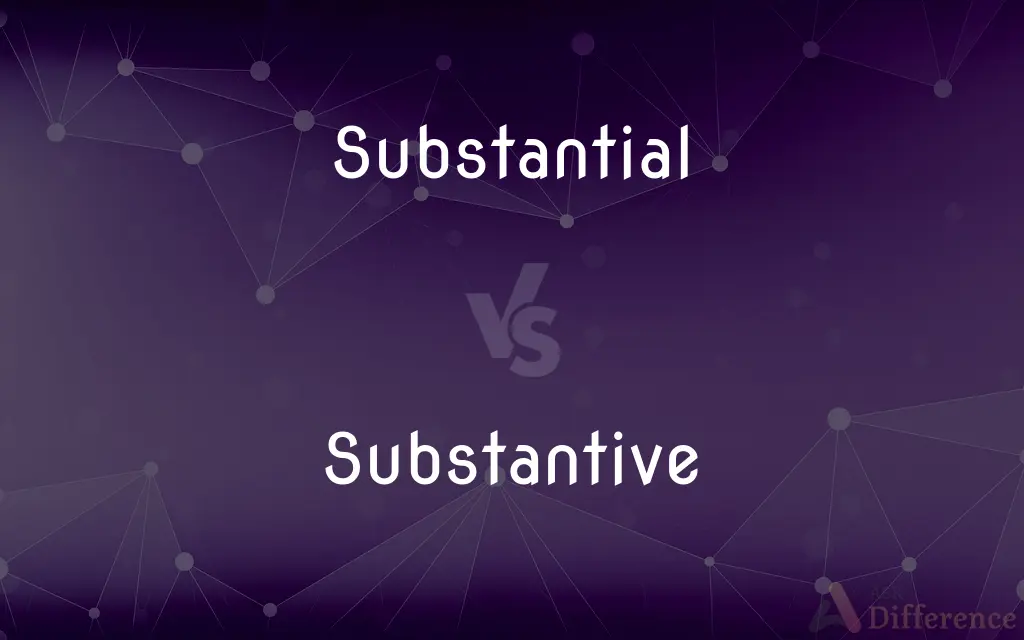Substantial vs. Substantive — What's the Difference?
By Tayyaba Rehman & Maham Liaqat — Updated on March 18, 2024
Substantial often describes something of considerable importance, size, or worth, while substantive refers to something that is essential, real, or having a firm basis in reality apart from form.

Difference Between Substantial and Substantive
Table of Contents
ADVERTISEMENT
Key Differences
Substantial is commonly used to denote something of significant size, value, or quality, suggesting that it is large enough to be noticeable or valued. It implies a considerable degree of importance or abundance in what is being described, whether in physical, financial, or abstract terms. Substantive, on the other hand, focuses on the essential nature or foundational aspect of something, emphasizing its inherent or real importance rather than its size or outward appearance. It is often used in legal, philosophical, or formal contexts to describe the fundamental aspects of an issue, policy, or debate.
While both adjectives imply importance, substantial often relates to the magnitude or degree, and substantive to the essence or inherent nature. In legal contexts, a substantive law defines rights and duties, as opposed to procedural laws which dictate how those rights and duties are enforced. This distinction underscores the focus of substantive on the core, essential elements of a subject.
Despite these differences, in everyday language, the terms can sometimes be used interchangeably when referring to something significant or important. However, understanding their nuanced differences can enhance clarity and precision in communication, especially in academic, legal, and professional settings.
Both terms contribute to the richness of the English language by offering nuanced ways to express the importance, size, and essence of various subjects and concepts, each bringing its own distinct perspective to discussions and analyses.
Comparison Chart
Definition
Of considerable importance, size, or worth
Essential, real, or having a significant basis
ADVERTISEMENT
Usage
Often relates to size, amount, or degree
Focuses on essential nature or core aspects
Contexts
General, including physical and abstract terms
Often legal, philosophical, or formal
Examples
A substantial amount of evidence
Substantive rights in law
Connotation
Implies largeness or abundance
Implies realness or essentialness
Compare with Definitions
Substantial
Considerable in size, amount, or importance.
She made a substantial contribution to the charity.
Substantive
Relating to the essence or most important aspects.
The debate moved beyond surface issues to substantive matters.
Substantial
Of considerable worth or value.
The investment yielded substantial returns.
Substantive
Of, relating to, or expressing the essential nature of something.
The committee focused on the substantive issues of the bill.
Substantial
Large and satisfying, often relating to meals.
The restaurant is known for its substantial portions.
Substantive
Having a firm basis in reality and thus important.
Her argument was grounded in substantive evidence.
Substantial
Solid in quality or not imaginary.
The project had a substantial basis in scientific research.
Substantive
Legal: defining rights and duties, as opposed to procedural.
Substantive law deals with the core rights of the individuals.
Substantial
Significant enough to be noticed or measured.
The policy change had a substantial impact on the community.
Substantive
Essential; substantial in the sense of being fundamental.
The reforms led to substantive changes in the education system.
Substantial
Considerable in importance, value, degree, amount, or extent
Made a substantial improvement.
Won by a substantial margin.
Substantive
Substantial; considerable.
Substantial
Solidly built; strong
Substantial houses.
Substantive
Independent in existence or function; not subordinate.
Substantial
Ample; sustaining
A substantial breakfast.
Substantive
Not imaginary; actual; real.
Substantial
Possessing wealth or property; well-to-do.
Substantive
Of or relating to the essence or substance; essential
Substantive information.
Substantial
Of, relating to, or having substance; material.
Substantive
Having a solid basis; firm.
Substantial
True or real; not imaginary.
Substantive
(Grammar) Expressing or designating existence; for example, the verb to be.
Substantial
Achieving the goal of justice itself, not merely the procedure or form that is a means to justice
Principles of substantial justice.
Substantive
(Grammar) Designating a noun or noun equivalent.
Substantial
Having a substance; actually existing.
Substantial life
Substantive
A word or group of words functioning as a noun.
Substantial
Not imaginary; real; actual; true; veritable.
Substantive
Of the essence or essential element of a thing.
Substantive information
Substantial
Corporeal; material; firm.
Substantive
(by extension) Constituting the substance of content rather than its style, and thus always nontrivial.
Substantive editing is never trivial, whereas some aspects of copyediting are trivial.
Substantive changes made by the lawyers
Substantial
Having good substance; strong; stout; solid; firm.
Substantial cloth
A substantial fence or wall
Substantive
Having substance; enduring; solid; firm; substantial.
Substantial
Possessed of goods or an estate; moderately wealthy.
A substantial freeholder
Substantive
(law) applying to essential legal principles and rules of right.
Substantive law
Substantial
Large in size, quantity, or value; ample; significant.
He inherited a substantial amount of money from his uncle.
A substantial number of people went to the event.
Substantive
(chemistry) of a dye that does not need the use of a mordant to be made fast to that which is being dyed
Substantial
Most important; essential.
Substantive
Depending on itself; independent.
Substantial
Satisfying; having sufficient substance to be nourishing or filling.
I don't just want a snack; I need something substantial.
Teddy had a few crackers in his backpack, but he needed something more substantial if he was to survive a three-day trek.
Substantive
(grammar) Of or pertaining to a substantive.
Substantial
Anything having substance; an essential part.
Substantive
Actually and legally held, as distinct from an acting, temporary or honorary rank or appointment
Substantial
Belonging to substance; actually existing; real; as, substantial life.
If this atheist would have his chance to be real and substantial agent, he is more stupid than the vulgar.
Substantive
Senseid|en|noun}} (grammar) {{clipping of noun substantive
Substantial
Not seeming or imaginary; not illusive; real; solid; true; veritable.
If happinessbe a substantial good.
The substantial ornaments of virtue.
Substantive
Part of a text that carries the meaning, such as words and their ordering.
Substantial
Corporeal; material; firm.
The rainbow [appears to be] a large substantial arch.
Substantive
To make a word belonging to another part of speech into a substantive (that is, a noun) or use it as a noun
Substantial
Having good substance; strong; stout; solid; firm; as, substantial cloth; a substantial fence or wall.
Substantive
Betokening or expressing existence; as, the substantive verb, that is, the verb to be.
Substantial
Possessed of goods or an estate; moderately wealthy; responsible; as, a substantial freeholder.
Substantive
Depending on itself; independent.
He considered how sufficient and substantive this land was to maintain itself without any aid of the foreigner.
Substantial
Fairly large;
Won by a substantial margin
Substantive
Enduring; solid; firm; substantial.
Strength and magnitude are qualities which impress the imagination in a powerful and substantive manner.
Substantial
Being the essence or essential element of a thing;
Substantial equivalents
Substantive information
Substantive
Pertaining to, or constituting, the essential part or principles; as, the law substantive.
Substantial
Having substance or capable of being treated as fact; not imaginary;
The substantial world
A mere dream, neither substantial nor practical
Most ponderous and substantial things
Substantive
A noun or name; the part of speech which designates something that exists, or some object of thought, either material or immaterial; as, the words man, horse, city, goodness, excellence, are substantives.
Substantial
Providing abundant nourishment;
A hearty meal
Good solid food
Ate a substantial breakfast
Substantive
To substantivize.
Substantial
Of good quality and condition; solidly built;
A solid foundation
Several substantial timber buildings
Substantive
A noun or a pronoun that is used in place of a noun
Substantive
Being the essence or essential element of a thing;
Substantial equivalents
Substantive information
Substantive
Applying to essential legal principles and rules of right;
Substantive law
Substantive
Having substance and prompting thought;
A meaty discussion
Common Curiosities
Can a meal be described as substantive?
Although less common, a meal can be described as substantive if it's meant to imply that it's not only large but also nourishing or essential.
How do I know whether to use substantial or substantive?
Consider whether you're emphasizing the size, importance, or quantity (substantial) or the essential, real nature (substantive) of something.
Is substantive always related to legal matters?
While often used in legal contexts, substantive can describe any discussion, policy, or issue that focuses on essential aspects.
Can a topic be both substantial and substantive?
Yes, a topic can be both if it is significant in size or scope (substantial) and deals with core, essential matters (substantive).
Are substantive discussions always formal or academic?
Not necessarily, but substantive discussions typically involve a serious, in-depth examination of a topic, which often occurs in more formal or academic settings.
Can an increase in numbers be described as substantive?
It's more accurate to describe an increase as substantial when referring to its size or amount. Substantive would imply the increase has a fundamental importance or reality to it.
Can a change be both substantial and substantive?
Yes, a change can be substantial in its scope or impact and substantive in affecting the fundamental aspects of a system or entity.
Does a substantive role imply a significant amount of work?
A substantive role refers to a position that is essential and central to the operations or purposes of an organization, which often implies significant responsibilities.
Can personal relationships be described using these terms?
Yes, relationships can be described as substantial if they are significant in time or impact, and substantive if they are meaningful and based on fundamental emotional or intellectual connections.
How do these terms relate to qualitative vs. quantitative analysis?
Substantial is more aligned with quantitative aspects (size, amount), while substantive aligns with qualitative analysis (essence, importance).
Is a substantial argument always persuasive?
A substantial argument has a considerable amount of evidence or reasoning, which can make it persuasive, but effectiveness also depends on how the argument is presented and perceived.
Can a law be both procedural and substantive?
Laws are typically categorized as either procedural (outlining the process) or substantive (defining rights and duties), but some laws might contain elements of both.
How does the use of substantial vs. substantive affect the perception of a statement?
Using substantial can emphasize the size or impact of something, while substantive highlights its importance and foundational nature, potentially altering the perceived depth or seriousness of the statement.
Is there a difference in formality between the two terms?
Substantive can sound more formal or academic, especially when used in legal or philosophical contexts, compared to substantial.
Are there instances where substantial and substantive are used interchangeably?
In casual conversation, they might be used interchangeably to denote importance or significance, though they have distinct meanings in more precise or technical contexts.
Share Your Discovery

Previous Comparison
Remediate vs. Mitigate
Next Comparison
Acronym vs. AcrosticAuthor Spotlight
Written by
Tayyaba RehmanTayyaba Rehman is a distinguished writer, currently serving as a primary contributor to askdifference.com. As a researcher in semantics and etymology, Tayyaba's passion for the complexity of languages and their distinctions has found a perfect home on the platform. Tayyaba delves into the intricacies of language, distinguishing between commonly confused words and phrases, thereby providing clarity for readers worldwide.
Co-written by
Maham Liaqat












































